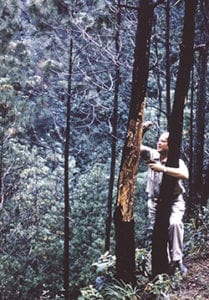News
Honoring the Life and Work of Jean Pierre Vité
 Jean Pierre Vité, renowned German forest scientist and former Director of the Forest Biology Program at the Boyce Thompson Institute passed away July 5 at the age of 93. Vité was a pioneer of forest pest control research and his work on the pheromones produced by bark beetles led to the development of natural means to protect trees from insect damage.
Jean Pierre Vité, renowned German forest scientist and former Director of the Forest Biology Program at the Boyce Thompson Institute passed away July 5 at the age of 93. Vité was a pioneer of forest pest control research and his work on the pheromones produced by bark beetles led to the development of natural means to protect trees from insect damage.
Vité joined the institute in 1957 to direct research at the Grass Valley Forest Research Laboratory in California. On 740 acres of land donated by the Newmont Mining Company—an operation initially founded by William B. Thompson—he built up a forest research program from scratch to study destructive western bark beetles. Later, he repeated the process near Beaumont, Texas, on land donated by lumber companies to establish the Southern Forest Research Institute.
Vité first discovered the existence of aggregation pheromones while working with David Wood, now a Professor Emeritus at the University of California at Berkeley, but who was a graduate student in his lab at the time. Subsequent work by the Vité team, which included Professor Emeritus J. Alan Renwick, resulted in the identification of key chemical compounds in the pheromone complexes given off by several bark beetle species. These have been used to trap beetle populations and to protect healthy trees from attack. One such compound, called verbenone, is given off by males of Dendroctonus species to signal other beetles to move to a new tree. This is now sold commercially and is used as a repellent against mountain pine beetles.
His discoveries led to better forest management practices and his programs were highly successful in Texas and in Idaho, where he worked with Potlatch Forest Industries.
“Foresters previously were using insecticides to try to kill the beetles, but these were actually killing all the predators and parasites on the outside of the bark, while the beetles were protected on the inside,” said Renwick. “In Texas, changing the practice helped the forest industry tremendously.”

His research also brought Vité to Honduras and Mexico. During a layover and subsequent research trip in Guatemala, his group discovered a new bark beetle species, which was named Dendroctonus vitei.
Vité returned to Germany in 1973 to assume the chair of Forest Zoology at the Albert Ludwig University of Freiburg, where he worked until 1990. In his lifetime he wrote more than 100 scientific publications and completed a two-volume set entitled “The wood-destroying insects in Central Europe.”
His work earned him the Karl Abetz Prize in 1981, which was given by the Institute of Forest Utilization and Work Science at the University of Freiburg to recognize outstanding contributions to increasing economic efficiency in forestry operations. Vité also received the Order of Merit 1st Class of the Federal Republic of Germany in 1988 and the Karl Escherich Medal of the German Society for General and Applied Entomology in 1989.
Vité was born in 1923 in the town of Groß Jehser in eastern Germany. He was predeceased by his wife and two daughters and is survived by a daughter and two sons. He will be dearly missed by his friends, family and colleagues.
“He was always full of enthusiasm,” said Renwick. “He was very inspiring to everyone around him.”

